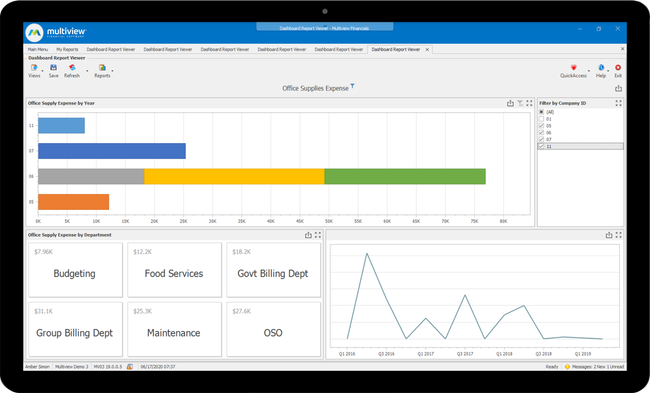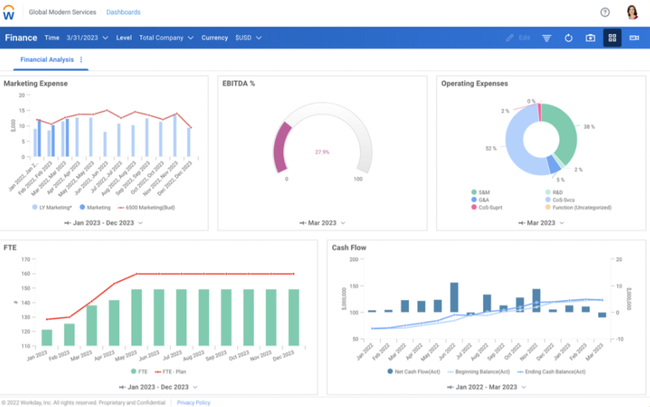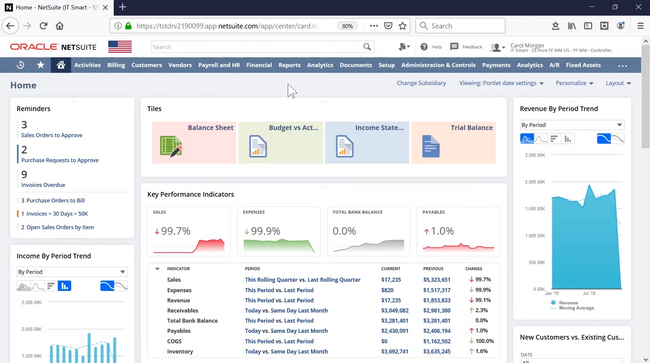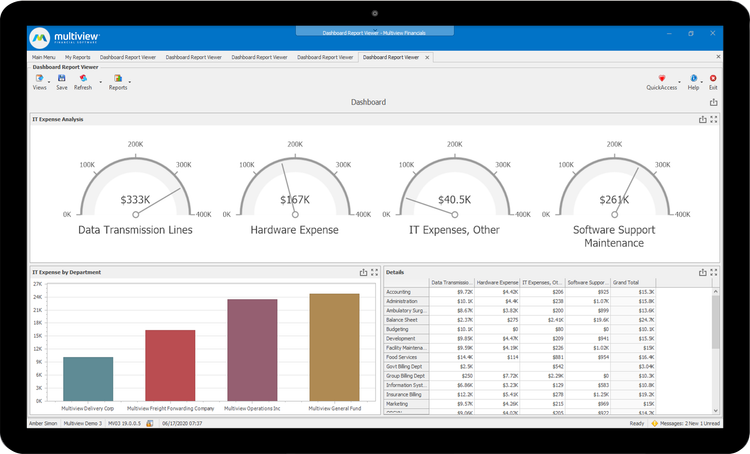Best Healthcare ERP Software
Healthcare software can improve the management, delivery, and analysis of patient care by streamlining operations. We analyzed the top solutions for hospitals, clinics, pharmacies, and rehabilitation centers.

- ViewPoint tool offers strong reporting and analytics
- Scalable, user-based pricing model
- Includes 18 fully integrated modules for different industries

- Brainstorms from community suggestions
- Configuration flexibility
- Powerful frameworks

- Hundreds of third-party add-ons available
- Feature sets for multiple industries
- Highly customizable
In this guide, we reviewed the best systems that offer key features like patient management, telemedicine, and electronic health records.
- Multiview: Best EMR Integration
- Workday: Strong Supply Chain Management
- NetSuite: Best for Midsize Facilities
- SAP Business ByDesign: Most Scalable
- Infor CloudSuite Healthcare: Best Cloud Option
- Dynamics 365: Best Product Ecosystem
- Acumatica: Best for Multi-Entity Support
Multiview - Best EMR Integration
Multiview has an EMR360 integration that enhances healthcare operations by connecting your organization’s financial, accounting, and EMR systems. This integration links patient data, billing, and financial records, helping improve efficiency and accuracy.
When you enter data, such as patient visits, diagnoses, treatments, and billing codes, into the EMR system, it automatically transfers this data into the accounting system for accurate invoicing and claim management. For example, if a patient comes in for a consultation, you enter their diagnosis, treatment plan, and billing information into Multiview. With the integration, as soon as the visit is completed, the patient’s details will be transferred to the financial system for invoicing. The billing department can then process a payment, and any financial adjustments will be reflected back into the patient’s medical records.
Multiview helps reduce the risk of billing errors and ensures the clinic is reimbursed quickly and accurately. The EMR360 integration can also run reports on patient revenue, track outstanding claims, and align with healthcare regulations.
Workday - Strong Supply Chain Management
Workday’s supply chain management module can help streamline operations for healthcare organizations. Specifically, its AI-powered procure-to-pay software helps control costs for medical supplies. Its Illuminate AI proactively monitors supplier performance risk using real time data, ensuring you’re getting the best prices on goods from your vendors. This can really help identify areas of overspend and reduce overall procurement costs organization-wide.
You can also configure enterprise-level controls over spend. Configure detailed transaction rules that stay consistent with your organization’s best practices. You can also set role-based restrictions so only management has permission to create purchase orders or requisitions. This goes a long way for national or even global healthcare providers managing several large hospitals, as medical supply ordering can lack accountability without the right safeguards in place. Plus, the rules ensure all locations are only ordering what they need to keep costs low.
Workday is built for enterprise companies with over 2,000 employees across multiple entities. Because of its complexity and feature depth, pricing is not available publicly. That said, expect your yearly subscription costs to be over $100,000.
NetSuite - Best for Midsize Facilities
NetSuite is a cloud-based ERP software that offers several features and capabilities that make it a suitable choice for healthcare organizations. First, the cloud-based nature of NetSuite also provides healthcare professionals with anytime, anywhere access, which is essential for optimizing workflows and patient care coordination.
NetSuite’s scalability makes it a viable option for mid-sized healthcare facilities that have outgrown basic accounting solutions. Its ability to handle inventory control, time tracking, and supply chain management is particularly relevant for distribution within the healthcare sector.
SAP Business ByDesign - Most Scalable
SAP Business ByDesign provides an integrated ERP solution that supports a wide range of business operations. For healthcare facilities, this means handling everything from basic finances down to procurement, compliance management, supplier relationship management, and HR.
The adaptability of SAP Business ByDesign is also crucial for healthcare organizations, as it allows providers the ability to respond to changing regulations. Overall, SAP Business ByDesign offers healthcare organizations a scalable, adaptable, and comprehensive ERP solution that can streamline operations and enhance the ability to deliver high-quality patient care.
Infor CloudSuite Healthcare - Best Cloud Option
Infor CloudSuite Healthcare offers integrated ERP capabilities that can greatly benefit healthcare institutions by providing deep visibility into operations to facilitate more informed, timely decisions. Budgeting, forecasting, and global statutory reporting are good fits for healthcare facilities with more complex financial and HR requirements.
One notable advantage for healthcare organizations is managing their entire business within a flexible and secure cloud infrastructure, eliminating the need for costly hardware upgrades and ensuring the latest software updates without hassle. In the healthcare sector, where supply chain management is vital for the availability of medical supplies and equipment, Infor CloudSuite’s supply chain management capabilities, including procurement, contract management, and mobile supply chain management, can help streamline operations and ensure efficient service and delivery.
Dynamics 365 - Best Product Ecosystem
Microsoft Dynamics 365’s comprehensive suite of functionalities, including finance, human resources, and operations, makes it well-suited to address the multifaceted needs of healthcare institutions. The software’s integration capabilities with other Microsoft services like Office 365 and Power BI are particularly advantageous for healthcare facilities aiming to unify their operations and leverage familiar tools.
Dynamics 365 offers healthcare institutions the automation of recurring tasks like invoicing and reporting, streamlining administrative processes. Furthermore, the flexibility of deployment, including cloud and on-premises options, caters to the diverse IT infrastructure setups commonly found in healthcare environments.
Acumatica - Best for Multi-Entity Support
Acumatica is an ERP with open architecture, which facilitates rapid integrations, can be particularly advantageous in healthcare, where interoperability with various systems like EHR and Laboratory Information Systems (LIS) is crucial for seamless patient care and data management. Furthermore, the platform’s multi-entity support is valuable for healthcare organizations with multiple facilities, allowing for efficient global financial consolidation.
Healthcare’s complex and evolving requirements can result in the need for customizations and modules, and Acumatica’s consumption-based pricing model allows organizations to tailor the ERP precisely to their needs.
What is Healthcare ERP software?
ERP software for the healthcare industry optimizes various administrative and operational processes at hospitals, clinics, and other medical practices. It helps these organizations manage resources, improve efficiency, and enhance patient care.
Before implementing an ERP system at a healthcare facility, it’s essential to carefully assess your organization’s needs and select a solution that aligns with your goals and regulatory requirements. Additionally, ongoing monitoring and optimization of the ERP system are crucial for long-term success.
Key Features
ERP for the healthcare industry needs to include these key features:
- Patient Management: Manage patient registration, appointment scheduling, and electronic health records (EHR) all in one place for seamless care coordination.
- Financial Management: Comprehensive financial tools, including billing, invoicing, insurance claims processing, and revenue cycle management, are essential for healthcare facilities to maintain financial stability.
- Human Resources Management: HR modules can manage employee information, payroll, and scheduling, and ensure compliance with healthcare regulations.
- Compliance: Healthcare ERP software should help organizations adhere to regulatory requirements like HIPAA and the Health Information Technology for Economic and Clinical Health (HITECH) Act while maintaining high-quality standards in patient care.
- Vendor Management: Healthcare ERP systems should support procurement processes, vendor evaluations, and contract management when sourcing medical supplies and equipment.
- Inventory Management: Effective inventory management features can help track stock levels, manage expiration dates, and reorder supplies as needed.
- Analytics and Reporting: These analytical tools help healthcare facilities gain insights into daily operations, make data-driven decisions, and track key performance indicators (KPIs).

What to Look for in Healthcare ERP
Here are a few other things to consider when searching for healthcare ERP software:
- Vendor Reputation: Request customer references and case studies from the vendor to understand better how they will work for you.
- Data Security Compliance: Check whether your ERP’s data compliance meets HIPAA standards and other relevant security regulations.
- Customization: The chosen ERP system should allow for customization to adapt to specific workflows and requirements of your healthcare organization.
- User Training: Proper staff training is essential to ensure all users understand the full benefits of the ERP system.
- Scalability: Ensure that the ERP system can scale as your healthcare facility grows to accommodate increasing patients, staff, and resources.
- Total Cost of Ownership (TCO): Evaluate the total cost of ownership, including upfront costs, ongoing maintenance, and support fee to see if it fits within your long-term budget.
- Support and Maintenance: To minimize service interruptions, create an internal tech support team or contract maintenance services from the vendor.
- Integration: Assess the ERP system’s ability to integrate with existing systems and future technologies to avoid data silos and enhance interoperability. Popular integrations include clinic management and EHR software.










































